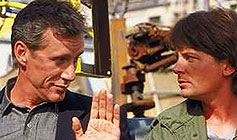|
|
|
|
The Hard Way
|
 |
|
In America,
Touchstone – the revamped version of Walt Disney Productions – seemingly
perfected the formula for a successful, commercial movie in the late 1980s and
early ‘90s.
Touchstone’s
films (such as Pretty Woman, 1990)
are in fact the most obviously calculated, contrived, formulaic films made
anywhere in the world. The Touchstone recipe: take a few stars, alternate a few
different genres, mix in the latest pop culture fads, and provide either a feel-good
emotional clinch or a bloodless action sequence every ten minutes.
Director John
Badham made Stakeout for Touchstone
in 1987; with his own production company, he is clearly trying to emulate the
same, sure-fire formula here. The Hard
Way is a paradoxical object: soulless and pointless, but undeniably well
crafted and entertaining.
Badham is a
master at holding together hybrid action-comedies that, in lesser hands, would
almost certainly fall apart. The Hard Way,
scripted by Daniel Pyne (Pacific Heights, 1990) and Lem Dobbs (The Limey,
1999), forces together Michael J. Fox (doing his familiar comic routine) as
Nick, and James Woods – that nervy, manic, brilliant actor who tore up the
screen in Cop (1988) and Best Seller (1987) – as Moss. Woods
plays a renegade cop (what else?), and Nick is the pampered Hollywood star who
gets assigned to Moss’ beat to research an upcoming part.
Nick gets on
Moss’ nerves from the word go, placing The
Hard Way in a very long line of contempory films about crazily mismatched
law-enforcers (Downtown [1990], 48 Hrs. [1982], Stakeout, Alien Nation [1988]) – a
subgenre baptised the buddy-cop movie. Fox’s presence allows a flood of clever
jokes about contemporary Hollywood, with its sequels and fads, while Woods’
rampaging sets up the spectacular, tough-guy set-pieces in back alleys and atop
skyscrapers.
Every time it
threatens to become just an anthology of the best moments from related hit
movies, Badham plays a sly game with our expectations. When Nick, robbed of his
luggage in a black ghetto, announces he’s going into a nearby joint to get it
back, we instantly recall Eddie Murphy turning a redneck bar upside down in 48 Hrs. But the camera doesn’t follow
Nick inside; it simply waits a few beats to see him come crashing out though
the front window, defeated and humiliated.
The central
and cleverest idea involves the discrepancy between Nick’s movie-inspired
fantasies, and the gritty, violent reality into which he is plunged. Wherever
Nick goes, he sizes up the situation’s cinematic potential: “It’s so real, so
dirty … just like a movie!” The real laugh comes from our recognition that what
he sees is indeed just a movie: Hollywood’s latest set of sanitised low-life
clichés, expertly manipulated by Badham.
There is much
in The Hard Way that, in true
Touchstone style, is derivative and mechanical, including Moss’ Clint
Eastwood-style problems with emotional intimacy, or the ascetic, punk-chic,
evil-genius psycho-killer The Party Crasher (!) played by Stephen Lang.
Yet, at its
best, Badham’s film is intricate, energetic, exhilarating entertainment.
MORE Badham: Nick of Time, Point of No Return, Blue Thunder © Adrian Martin June 1991 |
![]()